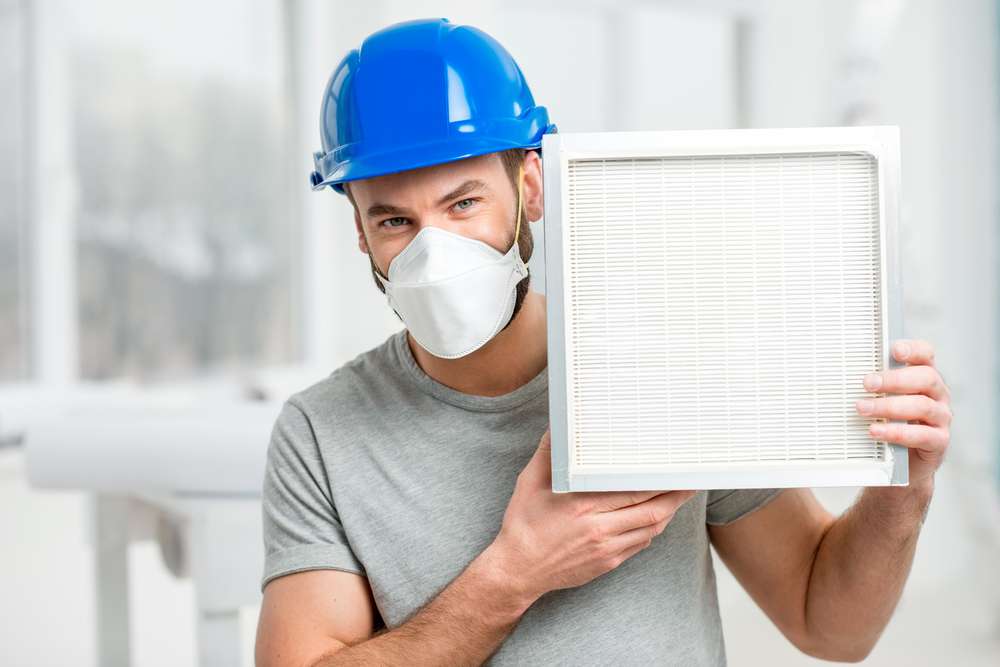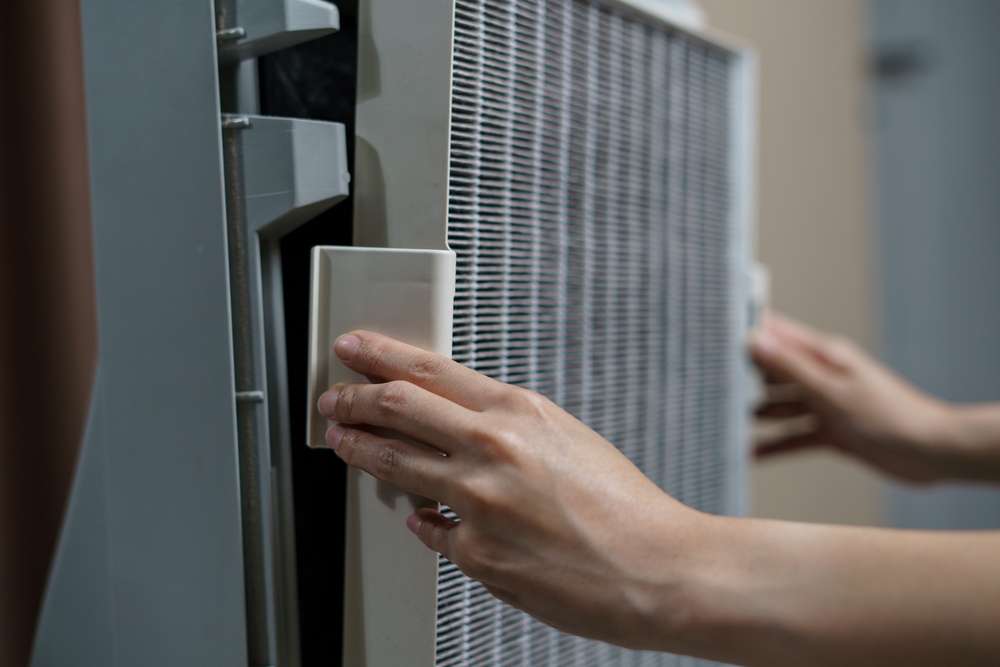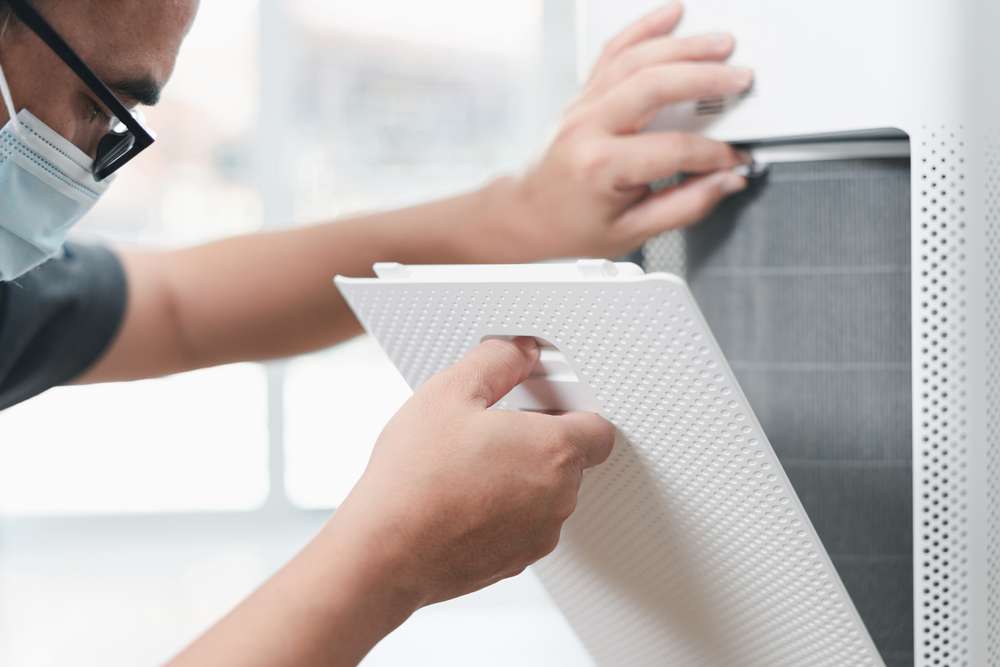HEPA filters are the best of the best when it comes to air purifier filters. That doesn’t mean they last forever though. So, how often should you change the HEPA filter in an air purifier?
HEPA filters should be replaced according to manufacturer recommendations. This can often be found in the product information. While the recommendations won’t cover every person’s situation, they’re a good start. You can also look for signs that the filter needs to be changed. These signs include if it’s dirty, if it smells, device alerts, and using an air quality monitor to see if it’s still cleaning the air well.
What Is A HEPA Filter?

HEPA stands for “High-Efficiency Particulate Air.” It’s a type of air filter that is very good at what it does. For a filter to be HEPA it must be able to filter 99.7% of particles that are, at worst, only 0.3 microns in diameter. Human hair, on the other hand, is about 30-70 microns in diameter, give or take a few. So, the filter has to be really, really good at filtering really, really small things.
True HEPA Filters
True HEPA filters follow the 99.7% and 0.3 microns standards. Many air purifiers use true HEPA filters and so do heating, ventilation, and air conditioning or HVAC systems. There are also HEPA-type filters, which are not the same thing.
HEPA-Type Filters
HEPA-type Filters are cheaper versions of true HEPA filters, which means they’re not as effective. For example, a HEPA-type filter might only filter out 99% of particles that could be bigger than 0.3 microns. These differences are pretty small, but it’s important to know what you’re paying for and what it’s going to do for you.
The Three Things That Affect A HEPA Filter’s Lifetime
1. Number Of Hours And Fan Speed
If an air purifier is running all day at the highest speed possible, the HEPA filter is going to be trapping more particles more quickly. That means it’s going to reach its limit more quickly too.
2. How Much Indoor Air Pollution There Is
Another thing that’ll make a HEPA filter reach its limit more quickly is how much pollution there is inside. The more there is, the more the HEPA filter is going to have to be replaced.
3. The Size Of The HEPA Filter
The larger the HEPA filter the more particles it can trap. The smaller the HEPA filter the fewer particles it can trap.
The 5 Signs A HEPA Filter Needs To Be Replaced

1. It’s Dirty
Looking at the air filter every once in a while goes a long way. If you notice it’s starting to get pretty dirty, it’s time to replace the filter.
2. Musty Smell
If your air purifier starts to smell bad, it could be coming from the HEPA filter, which means it’s time for a change.
3. Air Quality Monitor
Air quality monitors test how many particles are in the air. If you’ve been running your air purifier for a while and there are still lots of particles in the air, it might be time to change the HEPA filter.
4. Manufacturer Recommendations
Manufacturer recommendations may not apply to every person’s situation, but that doesn’t mean they can’t give you some idea of when to replace the HEPA filter.
5. Device Alerts
Many air purifiers will tell you when to change their filters. Listen for these alerts so you know when it’s time to make the change.
How Often Should You Change HEPA Filters In An Air Purifier?

In general, the best practice is to replace a HEPA filter according to manufacturer recommendations (or when the device tells you with an alert). That doesn’t necessarily mean those recommendations are going to work for each person’s situation though, so pay attention to the signs. Investing in an air quality monitor can also give you an idea of how often it should be replaced.
What About Replacing Other Filters?
Pre-filters and activated carbon filters follow all of the same signs and suggestions as HEPA filters.
The 3 Ways To Get Rid Of Old Filters
1. Recycle Them
It is possible to recycle air filters, but it may not be easy. The problem with air filters is that they’re made of several materials, and once they get dirty, many recycling companies won’t take them. The best thing to do is to contact either local recycling or HVAC companies and see if they can recycle the filters.
2. Throw Them Away
It’s not environmentally friendly, but if you can’t figure out anything else to do with it, throwing it away is always an option.
3. Use Washable Or Permanent HEPA Filters Instead
Rinse washable HEPA filters off with cold water. Vacuum permanent HEPA filters with a brush attachment to clean as much of the filter as you can. Even though these filters can be reused that doesn’t mean they’ll last forever, so continue to pay attention to the signs of a filter going bad and replace when necessary.
Key Takeaways: How Often Should You Change HEPA Filter In Air Purifier?
When it comes to “how often should you change HEPA filter in air purifier” the best advice is to follow what the product information says to do. There are other ways to figure this out such as if the HEPA filter is dirty, how it smells, or when the device tells you to change it. Paying attention to those signs will help if the product information doesn’t quite fit your living situation. We’re curious though, ever had to change a HEPA filter before? How did you know when it was time to do so? Let us know in the comments below!

